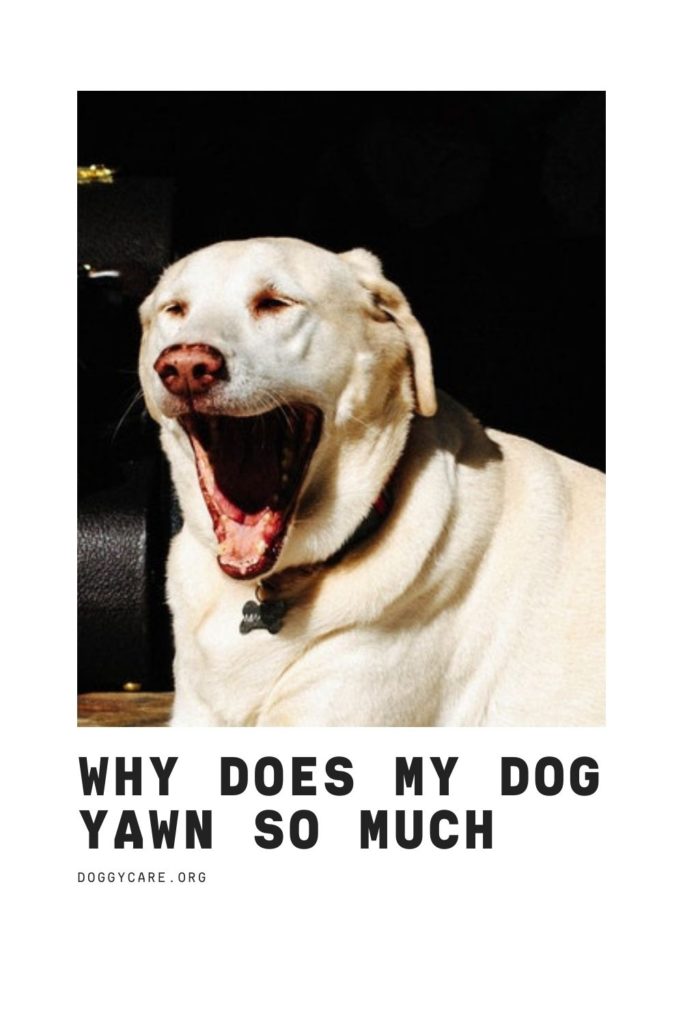- You are here:
- Home »
- Dog Behaviour
- » Why Does My Dog Yawn So Much?
Why Does My Dog Yawn So Much?

Did you know that during communication, only 7% of it is verbal? The other 93% within that equation are nonverbal cues, such as the tone of the voice, body language, and eye contact. Nonverbal communication is everywhere. People communicate without speaking quite often. We smile at things we like or frown when something upsets us. We wave to say hello and goodbye. We look down when we did something wrong and we look up when we feel proud. Nonverbal communication is ingrained in our daily life.
Dogs are also similar. They also have their own nonverbal cues and body language. They wag their tail, shake their body, and rub against each other. One thing that both men and dogs have in common is the ability to yawn.
Why Does My Dog Yawn So Much?
Yawning is a common activity dogs do. You may catch a glimpse of your dog yawning every now and then. For people, yawning is a sign of fatigue or boredom. We also yawn sometimes to regulate the body’s temperature and to help us stay cool. But for dogs, yawning is a fine example of nonverbal communication. There are plenty of reasons why dogs yawn and they mostly communicate different meanings.
They Yawn as a Calming Signal
Dogs yawn whenever they are faced with something threatening, which is, in most cases, an aggressive dog or stranger. Dogs yawn as a pacifying strategy. Yawning does not signify that a dog is being submissive to another dog, but rather that it simply does not want to start any conflict. This behavior has been documented in both domestic dogs and wild canines like wolves. Yawning in front of strangers, human or animal, shows that they are indifferent and don’t want any trouble.
Asides from not wanting to fight, yawning can also be interpreted as a dog on its wit’s end. When a dog continuously yawns, it means that it is frustrated and mentally exhausted. A dog can also yawn if it is feeling confused with a trick or command and wants things to either slow down. When you see this happening while training your pooch, tone down the exercise and give your furry pal a water break.
They Yawn To Show Anxiety
Do you ever see your dog yawning when you call it for bath time? Or maybe you might catch it yawning while on a vet’s appointment. Dogs yawn when they are anxious. When something is making a dog nervous, it tends to yawn to calm itself down. Other events that are stressful for the dog, like witnessing a fight breakout or after being scolded. Most of the time, the yawning will go away when the dog is no longer feeling tense.
On the flip side, dogs also yawn when they are very excited. You might see them yawn when it is time to walk or if you are giving them a treat. Dogs yawn when they are anticipating something exciting. So the next time you pick up your coat and you notice your dog is yawning, it does not mean that it is feeling lazy and wants to stay at home. Rather, your dog is excited and wants to join you on a playdate.
They Yawn Just Because They’re Tired
Finally, dogs yawn because they are simply tired. Similar to humans, dogs yawn when they are at rest and are ready to sleep. You will notice this while they also stretch their legs and back as well as create a nesting spot for them to rest. They can also yawn after a long day of training or playing. Constant yawning is a good sign that it’s time to let your canine have a break.
Yawning is Contagious for Dogs Too
Fun fact, but yawning is also something contagious for dogs! When dogs see another dog or their owner yawn, there is a chance that they too will yawn. There is currently no scientific research that is concrete enough to support why dogs yawn, but it is an observable phenomenon.
Should I be concerned if my dog yawn?
So the next time you see your dog yawn, look at your situation. Maybe it’s simply just tired and wants to have a quick sleep. Or maybe the dog is experiencing something that is making it anxious. Either way, there is nothing to be alarmed about when you see your dog yawn as it is a completely normal nonverbal cue that dogs do.